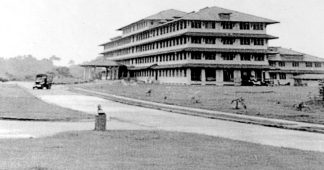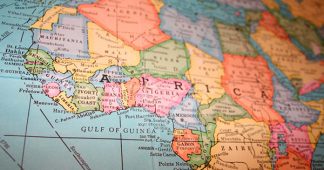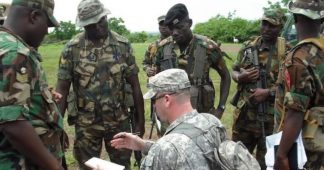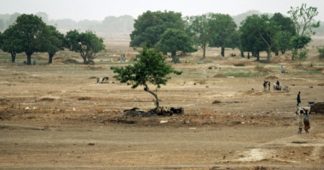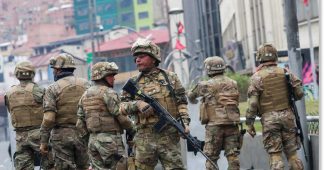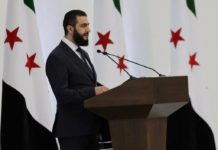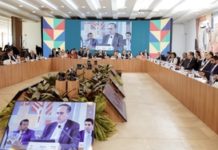Posted on
Americans should be experiencing an uneasy sense of déjà vu. In the last two years, U.S.-trained officers have overthrown West African governments at least four times. There are indications that other graduates have undermined civilian governments in other portions of the continent. But U.S. military officials have been less than informative. US Africa Command (AFRICOM) can’t explain why there has been a surge in coups. Indeed, AFRICOM insists that it doesn’t even know how often they’ve happened. That position reflects convenient ignorance, at best.
Maj. Gen. Andrew M. Rohling, the commander of US Army Southern European Task Force, Africa, insists that the Pentagon’s objective is to “showcase a way, the American way, that we train and build leaders not only in their tactical tasks, but in the ethos of the United States Army.” But as analyst Nick Turse, a fellow at The Nation Institute, observes, those values have been lacking in Africa, especially in West Africa, “where U.S.-trained officers have attempted at least nine coups (and succeeded in at least eight) across five West African countries, including Burkina Faso (three times), Guinea, Mali (three times), Mauritania, and the Gambia. The four most recent coups by US trainees have occurred in Burkina Faso (2022), Guinea (2021) and twice in Mali (2020 and 2021).”
The latest cases of officers who had received US military training going on to stage an epidemic of coups in Africa is reminiscent of the long, odious history of the School of the Americas (SOA). The US Army established that training center in 1946 at Fort Benning, Georgia. The curriculum emphasized the most up-to-date military tactics, especially in counterinsurgency warfare. But that was not the sole mission of the school. In addition to core military training, the goal supposedly was to educate officers from allied countries in Latin America about the importance of democratic values and civilian control of the military. During the next 54 years, the SOA trained more than 63,000 soldiers from 21 countries,
It is not certain whether US officials were sincere about promoting a commitment to democracy, or whether that stated objective was merely cynical propaganda. In any case, the results were appallingly bad. A December 2000 ABC News story by investigative reporter Barbara Starr noted that “The list of graduates from the School of the Americas is a who’s who of Latin American despots. Students have included Manuel Noriega and Omar Torrijos of Panama, Leopoldo Galtieri of Argentina, and Hugo Banzer Suarez of Bolivia.”
In addition to the School of the Americas being an incubator for future coup leaders, graduates amassed a horrid record on human rights. Critics derided the institution as a school for dictators, torturers, and assassins. The track record seemed to support that assessment. According to Starr, “graduates cut a swath through El Salvador during its civil war, being involved in the 1980 assassination of Archbishop Oscar Romero, the El Mozote massacre in which 900 peasants were killed, and the 1989 murders of six Jesuit priests.”
Other graduates engaged in torture and murder of people who dared oppose the dictatorships in Chile and Argentina during the 1970s and 1980s. “If you go through any human rights reports about any country in Latin America, then pretty much anyone who is named as an assassin, a dictator or torturer is likely to have passed through the school,” Lesley Gill, the author of The School of the Americas: Military Training and Political Violence in the Americas, stated in a February 2020 interview.
Faced with mounting pressure from Human Rights Watch and other human rights organizations, as well as surging criticism in the Western press, US military leaders responded as they usually do: by making a largely cosmetic change. In December 2000, the Pentagon announced the closing of the School of the Americas. The following month, a “new” facility opened at Fort Benning – the Western Hemisphere Institute for Security Cooperation. That training center was under the control of the Defense Department rather than the Army.
One substantive change was that only military personnel from democratic countries could attend. Previously, officers from even the most brutal and corrupt dictatorships were welcome. However, that restriction was not truly definitive. Military forces in some nominally democratic countries in Latin America have continued to engage in serious human rights violations. The conduct of security forces in Colombia is especially troubling.
The overall record of Latin American military personnel trained at Fort Benning has noticeably improved over the past two decades, but the news coming out of Africa suggests that the problem may simply have changed to a different arena. Leaders at AFRICOM contend that they do not bother to track the activities of foreign military officers once they have completed their training at US institutions. If true, that is a very odd practice indeed. However, the data that Turse and other analysts have gathered suggest that the coups and other undemocratic practices are numerous and growing.
There is one other troubling similarity between the developments in Latin America during the Cold War and the current developments in Africa. In the former case, US military leaders were so concerned about the communist threat that they were willing to look the other way as their Hemispheric partners unseated democratic governments and committed human rights abuses. Fear regarding the strength of Islamic extremism in Africa now appears to have reached the point that AFRICOM leaders are content to do the same. A willingness to work with graduates of the SOA who orchestrated coups and committed human rights abuses in Latin America disgraced the US military. The apparent indifference of the US military hierarchy to similar behavior by African alumni of US training programs creates the prospect of a similar disgrace.
* Ted Galen Carpenter, a senior fellow in defense and foreign policy studies at the Cato Institute, is the author of 12 books and more than 950 articles on international affairs.
Published at original.antiwar.com
We remind our readers that publication of articles on our site does not mean that we agree with what is written. Our policy is to publish anything which we consider of interest, so as to assist our readers in forming their opinions. Sometimes we even publish articles with which we totally disagree, since we believe it is important for our readers to be informed on as wide a spectrum of views as possible.
